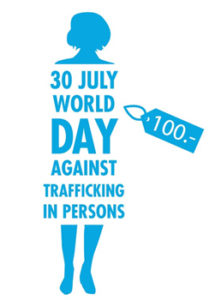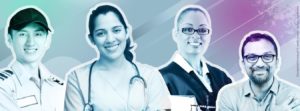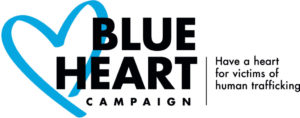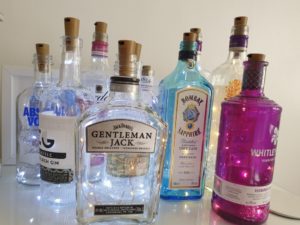What is Human Trafficking? As part of our Club’s contribution to 2020’s UN Day of Observance – International Day Against Trafficking in Persons – Immediate Past President Karen Whitworth offers up her take on what is a broad and very complex subject, and one which negatively impacts on our society and day to day lives much more than we might realise…
 What is human trafficking? Well, the charity Hope for Justice defines human trafficking as a person being forced into service against their will using physical, financial or psychological control. Often linked with trafficking is Modern Slavery, where one person controls another by exploiting a vulnerability. It is often linked with human trafficking, where a person is forced into a service against their will – usually forced work or prostitution. The control can be physical, financial or psychological.
What is human trafficking? Well, the charity Hope for Justice defines human trafficking as a person being forced into service against their will using physical, financial or psychological control. Often linked with trafficking is Modern Slavery, where one person controls another by exploiting a vulnerability. It is often linked with human trafficking, where a person is forced into a service against their will – usually forced work or prostitution. The control can be physical, financial or psychological.
There are 4 main types of exploitation – sexual, forced labour, domestic servitude and organ harvesting. The person can be moved within their own country or abroad. It is a crime where the people trafficked have little choice in what happens to them and they become a commodity owned by the traffickers and used for profit.
Who are the victims of human trafficking?
It is less well known that 26% of victims found in the UK were British and had been trafficked as:-
– homeless people being offered jobs that turn out to come with threats and very little pay
– teenagers groomed by gangs into criminal acts such as shoplifting
– young people and adults coerced or manipulated to act as drug couriers or dealers
– girls and women forced into prostitution.
Another charity Unseen UK, describes the most recent figures from 2016 where worldwide 24.9 million were in forced labour, 85% of whom are women.
What drives the global traffic in human beings?
The key drivers for being a victim include poverty, limited opportunities at home, lack of education, unstable social and political conditions and war.
In July 2019, 5 men and 3 women from one family were jailed after a 3 year investigation by West Midlands Police. Many were trafficked from Poland with the offers of good jobs but were paid as little as £10 a week for jobs that included picking onions, making fencing and sorting parcels. The traffickers make their victims claim benefits, then kept the money. If challenged where their money was going, the criminals claimed it was owed for travel, food and accommodation. But the workers were living in terrible conditions and if they complained or tried to leave, they were assaulted or threatened and were often moved for no reason. 88 victims of this gang came forward but it is believed that up to 400 people had been trafficked over a period of time.
Whilst the police are aware of the types of businesses that use trafficked individuals i.e. car washes and nail bars, they rely on the general public to be alert to businesses where staff are regularly changing or things that just don’t look ‘right’ i.e. clothing/bedding in a back room. So a big part of the work the charities and other organisations involved in stopping this crime is raising awareness in the general public.
It is very difficult to escape the gangs, and those who do contact the national helpline 0800 0121 700 can then be supported by dedicated organisations. Locally we have The Adavu Project which offers long term support to adult survivors of modern slavery so they can make the transition into a life in the local community as well as advocating justice and building partnerships to prevent and frustrate Modern Slavery
Barnardo’s is one of the few organisations in the UK who provide direct and specialist support to trafficked children. They help young victims cope with the practical and emotional traumas of being trafficked and work with social care services, the police and immigration.
 The UN theme for the World Day Against Trafficking in Persons for 2020 is focussing on the first responders to human trafficking. They work in different sectors to identify, support, counsel and seek justice for victims of trafficking.
The UN theme for the World Day Against Trafficking in Persons for 2020 is focussing on the first responders to human trafficking. They work in different sectors to identify, support, counsel and seek justice for victims of trafficking.
What are Soroptimists Doing?

At our Conference in 2018 clubs voted to support a partnership with ChoraChori for the next SIGBI Federation Project ‘Empowering Girls in Nepal’. This charity supports rape survivors, trafficked and vulnerable girls as they rebuild their lives, empower them through education and training into gainful employment and a future in society.
Midland Chase Region will be welcoming Philip Holmes, the founder and CEO of ChoraChori to talk to us at the Regional Conference on 13th September about the work being undertaken and the progress being made.

Like every other club in our Federation, SI Lichfield & District are fundraising for this appeal. Supporting one of the aims of our environmental subgroup ‘Planet’, our President Jenny has organised the ‘McLelland Gin Bottle Lamp Manufactory’. Empty gin and other bottles are being recycled and repurposed into useful table lamp decorations – and at £5 a bottle, a beautiful bargain!
How can I find out more about Human Trafficking?
If you are interested in other areas about this subject, please follow this link to read the blogs written by Carole Infanti (APD Prosperity) and Kim Ann Williamson (SI Cardiff). Or get in touch with us at Lichfield & District Club and join in our work!

